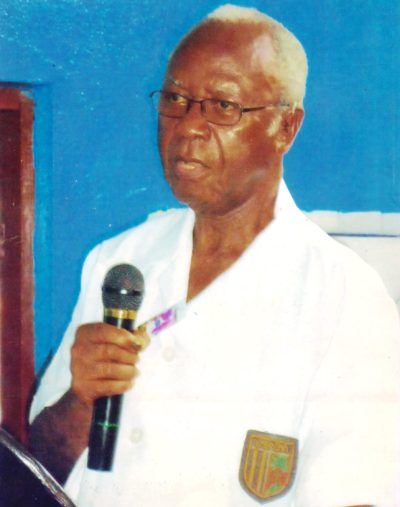
Puawui – Dr Sama Banya: Sierra Leone Telegraph: 23 March 2019:
One of my friends of my Prince of Wales School days, the late Physician Cardiologist Dr Reginald (Reggie) Eleady-Cole and I sailed to Britain on the Elder Dempster passenger boat MV Aureole on 3rd October 1953.
Oh the memory of those boats in the Freetown harbour in those days, with the “canoe boys” diving into the sea to retrieve coins thrown in by tourists. One had nine days of joy and relaxation, especially when the waters of the Bay of Biscay were calm. I recollect with nostalgia as Reggie and I shared the same cabin.
 The train journey from Liverpool’s Lime Street Station to London’s Euston station was another unique experience. I was mesmerised by the speed of the train as it kept crossing on-coming trains. Others overtook us and moved in an oblique direction, and I kept wondering why they didn’t collide head-on.
The train journey from Liverpool’s Lime Street Station to London’s Euston station was another unique experience. I was mesmerised by the speed of the train as it kept crossing on-coming trains. Others overtook us and moved in an oblique direction, and I kept wondering why they didn’t collide head-on.
Back in Sierra Leone, our rail system had only one track with trains crossing each other only by one train waiting for the on-coming at the last station.
London had the largest collection of daily newspapers in those days. They ranged from the serious Times with its boastfulness of “Top People read the Times, do you?” to the Daily Mirror which also boasted as having the largest daily net sales. The Sunday papers were nearly as plentiful; again they ranged from the Observer to the News of the World.
The newspapers were full of news. Some of them quite juicy. The News of the World was particularly rich in juicy news and other stories about the fall of people in high places.
There was another detestable characteristic of the other newspapers in the way they reported crime. It was always an Irish man, or Jamaican, or welsh man when any of those nationalities committed a crime. But when it came to an English man, he was simply referred to as a labourer of no fixed address.
In sports it was a great day for England when the victor or hero was an Englishman, but a great day for Britain when the winner was Scot, Welsh or Irish.
The situation is different today, as Britain is perhaps the most tolerant of the western democracies except perhaps ultra-nationalists and extremists. Irreverent reference to people of other nationalities is now generally frowned upon.
Of course there are frequent cases of extreme nationalism and anti-migrant sentiments in many countries – not just in Europe but in the Americas as well; anti-Semitism is creeping in as well.
And what about our own country Sierra Leone? How tolerant are we to other nationalities and ethnic groups?
Many years back, I expressed disappointment and frustration because of expressions like “Coral or dirty Lebanese; tiffy tiffy Indians.” There are still derogatory references to nationalities when individuals commit crimes.
Only a few years ago, our Foulah brethren suffered the same fate. But many people forget all too often that many places in the hinterland were opened up because Lebanese nationals went there as retail traders.
 The detestable practice of insulting an entire group because of the miscreant of one or two, is still common. In my memoirs I referred to my association with many Lebanese families – both in the Provinces and in Freetown.
The detestable practice of insulting an entire group because of the miscreant of one or two, is still common. In my memoirs I referred to my association with many Lebanese families – both in the Provinces and in Freetown.
It is the same story with a few prominent Indian families especially here in Freetown.
Early in the week, there was report of an assault occasioning actual bodily harm to a victim along Guard Street. But for the quick interference of sensible local residents as well as the police who quickly brought the situation under control, matters might have got out of hands.
Unruly, mostly unemployed youth had already taken matters into their own hands and had begun attacking Indian commercial houses, all because of the alleged misbehaviour of one Indian national.
If I commit a crime would it not be better and fairer to all if it is reported that “Sama Banya has at last been caught embezzling government funds, than to say Kailahun people are all thieves?”
Most newspapers have treated the Guard Street incidence with restraint and fairness, which is what it should be.
Gone should be the days when everything was generalised and attributed to particular ethnic groups. Just my take.

I’m delighted to see my old friend and colleague Dr. Sama Banya speaking clearly on the need for tolerance and understanding. I remember in my days in Sierra Leone in the 1970s and 1980s knowing Dr. Banya and having a great respect for his dedication, work and professionalism. I am delighted that he still so clearly continues to express these values.